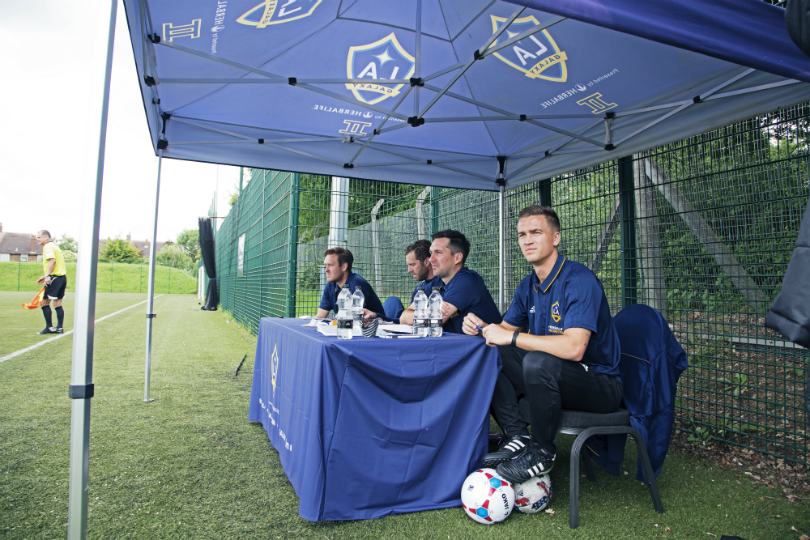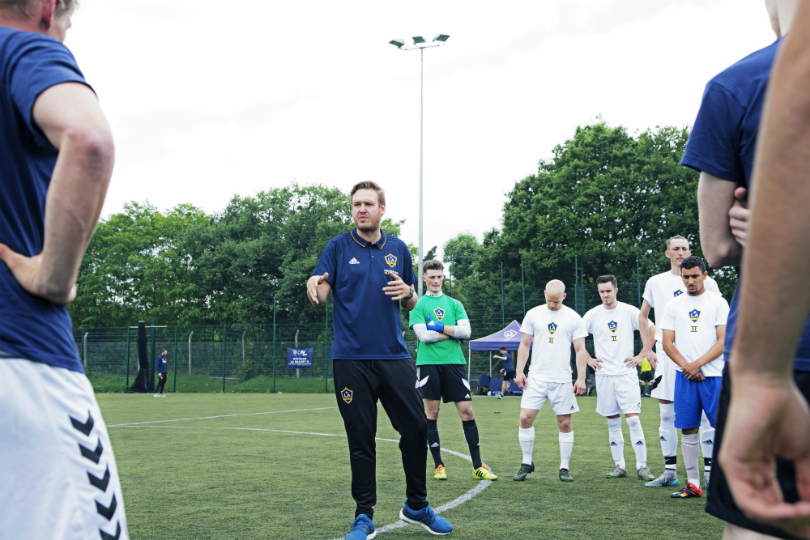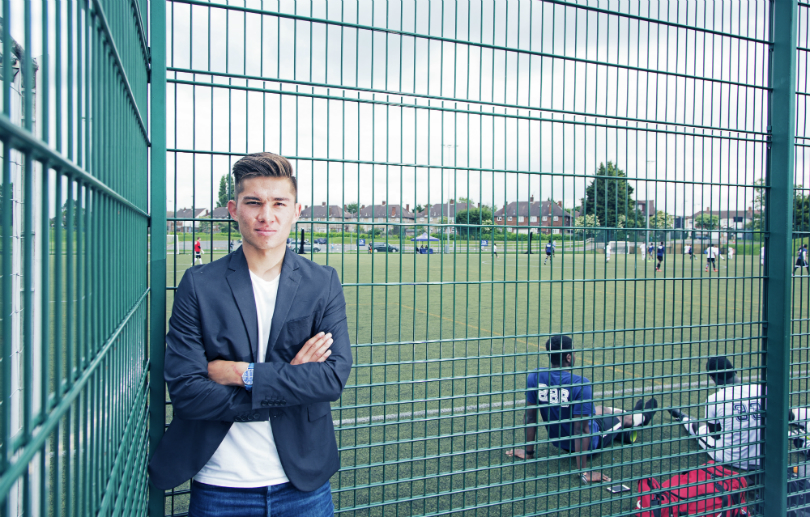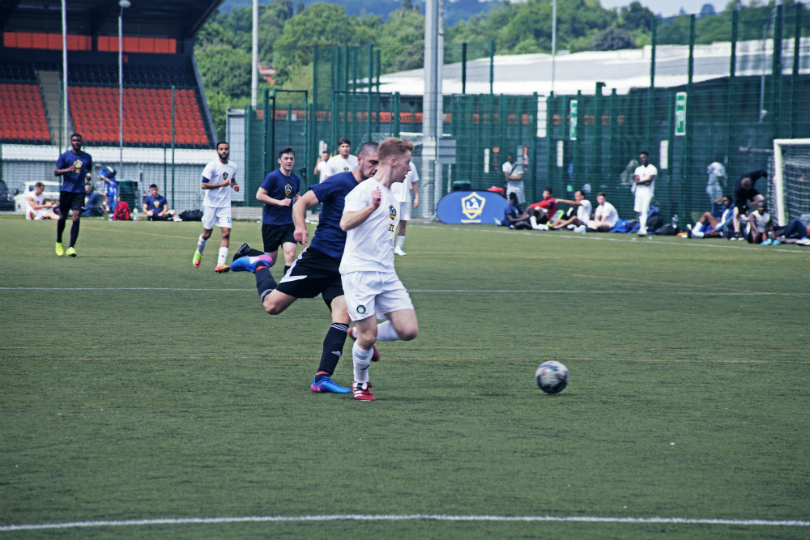Why did LA Galaxy hold trials in England?
LA Galaxy recently held open trials in London - FourFourTwo joined 350 wannabe footballers chasing the Hollywood dream

This article originaly appeared in the July issue of FourFourTwo
A Hollywood sun beats down on two astroturf pitches, where FourFourTwo is waiting in line for a football audition. A new life in LA is the prize at stake, but we’re a long way from California and the odds are not stacked in our favour.
Three-hundred wannabe footballers have assembled at The Hive, home of League Two side Barnet. Among them is a collection of cast-offs, hard luck stories and out-of-their-depth chancers, but there might just be some hidden gems in there too.
Field marshal Joseph O’Keefe patrols the side of one pitch like a drill sergeant as he organises the potential recruits into teams and tells them their kick-off times. “What’s your name and number sir?” he asks FFT. It’s 99, but we have a few hours to kill and questions of our own to ask.
MLS club LA Galaxy are holding their first ever open try outs in England for players aged between 18 and 25, starting with a two-day stint in the capital, before the search for talent continues in Manchester. Each player has two 60-minute games, played on consecutive days, to impress.
Five players from each camp will receive a call back for a further week-long, all expenses paid trial at the club’s StubHub center stadium. There, staff will examine the trialists’ talents more thoroughly, before deciding whether or not to offer them a full-time contract.
The X Factor-style format is no guaranteed formula for success, though. For the past five years the club have held trials in Los Angeles, Las Vegas and Tokyo, but so far only one player has been handed a deal. Early teething problems saw amateur players in their 30s and 40s turn up in the hope of playing out their childhood fantasies.
Get FourFourTwo Newsletter
The best features, fun and footballing quizzes, straight to your inbox every week.
At 28, FFT is one such dreamer, but while the club have made a special exemption to grant us a place and one last chance at hitting the big time, the rest of the entrants have paid £150 for their shot at the American dream. The fee was introduced as a deterrent to chancers and to help fund their global pursuit of talent.
It’s a curious experiment for a team who has built a reputation for signing big-name English players at the tail-end of their careers. David Beckham spent five years as a Galaxy player between 2007 and 2012, while Steven Gerrard and Ashley Cole have since followed in his footsteps.
And another Englishman has been at the heart of the drive to scour England for rough diamonds. Chris Howe is sat under a canopy at the side of one of the pitches, watching the first of eight trial games to be played on this scorching Wednesday. He’s the man responsible for organising the event.
“It’s something I’ve pushed for a long time,” he says in a thick Doncaster accent that is more Emmerdale than Sunset Boulevard. “Being from England, I know there’s talent here. Whenever I come home I watch my brother play college football and there are so many quality players who have fallen out of the academy system or simply not been spotted.”
Chasing the next Wright-Phillips, not the next Beckham
That conviction may also come from the growing number of English success stories in MLS. Jack Harrison left Manchester United aged 14 before continuing his education at a boarding school in the US and winning a contract with New York City FC. Now 20, the midfielder is regarded as one of the divison’s top prospects.
“Jack is a great example of someone who slipped through the net, came over to the US early and made a name for himself,” says Galaxy director of soccer operations, Gordon Kjlestan, who is sat to our left sipping on a large coffee to ease his jetlag. “I think academies in England and the US produce similar types of players, who are strong and athletic, but the average standard is higher in England and there are more quality players.”
Dom Dwyer is another English talent who has made it in America. The striker was culled by Norwich City’s academy in 2006 but was offered a scholarship at a college in Texas after being spotted playing non-league football for Staines Town. He has averaged a goal every other game in his four seasons with Sporting Kansas City.
However, the winning plane tickets are not certain to be slotted inside British passports. Such has been the interest in the trials, players from as far away as the Philippines, Kyrgyzstan, Sweden and Algeria have flown in for a once in a lifetime chance to strut their stuff in front of the Galaxy’s coaching staff.
FFT is concerned those who have travelled long distances may be given preferential treatment when it comes to selection. “It’s certainly a great starting point,” says Howe. “We’re happy to be providing an experience for someone who may not have this opportunity in their country. But the distance they’ve travelled won’t sway us – all we’re interested in is how they perform on the pitch.”
Whoever is successful over the next two days will initially play for the club’s reserve side, Galaxy II. The team plays in the United Soccer League [USL], one division below the MLS, and was formed to bridge the sizeable gap between their academy and first team. But it also serves another purpose.
“We’re here to find players who can strengthen our second team and are young enough to be developed into first team players,” Kjlestan explains. “We have two guys right now starting every week who played for our second team. The long-term goal is to do that consistently.”
The try-outs are also a way of circumnavigating rules regarding the signing of academy players. MLS teams are only allowed to recruit prospects who live within a 75-mile radius of their stadium or training ground. “There is so much talent in America that we just don’t get to see because the country is so big,” says Kjlestan. “This event allows us to watch players outside of our restricted area.”
Clubs are allowed to select up to three reserve team stars as ‘priority players’. This gives them the players’ MLS rights, which are normally owned by the league, enabling them to sell them on for a profit if they star for the first team in the future. Galaxy’s trials could help them to mine promising foreign players, who may yield a financial return in the future.
With each trialist also paying £150 for the opportunity (and two Fruit of the Loom LA Galaxy shirts), is cold hard cash the real reason for their transatlantic trip? “The trials aren’t huge moneymakers for us,” Howe insists. “It isn’t cheap for us to fly staff over from America, pay for accommodation and hire out facilities. We also have the cost of paying for 10 players to come to LA for a week.”
However, planting the Galaxy flag firmly on English soil is at least an added bonus of their visit. “England is definitely a place we want to grow our brand,” says Howe.“ We have a president who wants to push the club’s potential until it’s bursting at the seams.” While Beckham, Gerrard and Cole have given them a visible presence in England, a classic rags to riches Hollywood story would cement them in hearts and minds.

We’re interested to know exactly what they are looking for in their leading men. Former Galaxy goalkeeper Kevin Hartman knows a thing or two about star quality, having recently been inducted into the MLS hall of fame. FFT spots him staring out from another canopy on the adjacent pitch, and strolls over to get a heads up on his rider.
“I remember playing with Bradley Wright-Phillips at New York Red Bulls,” he says. “He wasn’t a top player in England but he came over and made a name for himself. We’re looking for someone who is maybe playing semi-professional football and has a reputation locally, with the potential and ambition to do that on a bigger scale in America.”
Wes Meadows, who works in youth development at the club, nods in agreement: “The background of the player isn’t important, only the quality,” he says. “We’ve had a few guys who have told us ‘I used to play for Liverpool when I was younger’, but that doesn’t matter. One thing we have noticed is it’s very hard to find defenders at trials; they are normally dominated by attackers. If you play in defence you might have a better chance later, there’s a lot less competition.”
It’s food for thought for FFT, a box-to-box midfielder by trade, but that can wait for now. We scan a list of names on a sheet of paper and ask if one or two have already caught their eye. “We saw a Swedish player called Christopher Forssell in our first game,” says Hartman. “He’s played in the equivalent of League Two in Sweden, so we’re keen to take a closer look at him.”
Standing out is no easy task, but 23-year-old Australian Nick Humphries is doing his very best to steal the show by wearing a blazer and cream chinos as he poses on the touchline. “I knew everyone else would be wearing training kit,” he laughs. One month ago he quit his job as a private banker in Budapest to embark on a 100-day challenge to win a professional contract. He spent the previous day on trial with QPR before clinching one of the last remaining spots today. He’s recording his progress on his YouTube channel.

“I was living a really comfortable life, but I wanted to get out of my comfort zone and fulfill my ambitions in football,” he explains. “I didn’t want to take the safe route in life, I really believe you have to try things when you’re young and follow your dreams. I’m a left winger but I’m playing left-back today so we’ll see how it goes.”
To give himself the best chance of success, he’s even employed one of his former coaches to give him advice along the journey. John Moses is a former Liberia international who claims to have played alongside the legendary George Weah for the national team. He was Humphries’ mentor at a local club in Budapest six years ago, before the pair reunited for this extraordinary adventure. Moses believes they can both reap the benefits of their working relationship.
“I played in Hungary, Germany, Finland, China and Dubai, so I know what it’s like to play in trials,” he says. “Nick is a really talented player and I believe he can have a career in the game. I have my Uefa B coaching licence and now I want to coach in England, so maybe an opportunity will arise for me as well along the way.”
From Woking to LA, via Loughborough University
Opportunity is something Victor Gomez has craved for much of his 22 years. He played for Mexican side Club America’s academy during his teens before injury saw him released. He has travelled to Barnet all the way from Houston, Texas with his girlfriend Jackie after growing frustrated at the lack of infrastructure and trials back home.
“The problem is that soccer is pretty much the last sport they play in the US, so it’s tough to get noticed,” he says. “I play for a Sunday League team but we don’t even have a coach. I read that over here you get taught to control and touch the ball so much when you’re young. I try to train alone to improve and use magazines and YouTube channels to improve, but it’s just not the same.”
FFT sympathises with Gomez’s plight, but can’t resist finding out how his first trial game went in a bid to get another steer on the competition. “I’m happy with how I played,” he continues. “I’m a winger but I had to play in a few different positions. The standard here is really good; there are a lot of players who are physically strong.”
One man who has had a little less distance to travel is Ohimai Longe. The 23-year-old is a born and bred Londoner who lives at home with his parents in nearby Finchley, but neither his mum or dad knows he has paid the last of his student loan to be here today. He’s a defensive midfielder who was a scholar at Yeovil Town and also had a spell at Woking before heading to university. He has been inspired by the story of one of his heroes.
“N’Golo Kante was playing in the second or third division in France a few years ago and now he’s one of the best midfielders in the world,” he says. “I played non-league for Loughbrough University and have just finished my degree in international relations, but I want to pursue a career in football. I still believe I can do it, but my parents are sick of me talking about becoming a footballer!”
It’s 2:30pm and 10 minutes until kick-off, but a problem is already threatening to ruin our big moment. The average height of our team is at most 5’8 and we appear to be part of a suspiciously youthful looking line-up. All trialists are required to show photo ID upon arrival, but one has gone to great lengths get around the rules. Bader Elramly, a 17-year-old college student, has used a fake ID, which suggests he’s 22 and a resident of New York. He plays for non-league Tooting and Mitcham, where West Ham’s Michail Antonio began his fairytale rise.

Admiring his creativity and remembering the Galaxy’s earlier tip-off regarding a lack of defenders on show at open trials, we decide to try a smart move of our own by volunteering to play centre-back in a 3-4-3 formation. It’s an unfamiliar position we’ve never played in before, and neither it seems have Elramly or our very vocal, but pocket-sized team-mate Jordan, who join us in a makeshift defence.
It’s a decision that backfires straight from kick-off. Noting an evident lack of height and several ill-judged attempts at setting an offside trap, an opposition team comprised of six-foot-plus semi-pros launches ball after ball over the top and into the ocean of space in behind. FFT does at least manage to sprint back and make two last-gasp clearances, but the writing is already on the wall.
By half-time we’re 4-0 down and there is a recurring voice echoing around our head. It’s not one of self-doubt or regret, but the sound of our team-mate Jordan barking Sunday League clichés and referring to us as ‘fam’. The second half continues in the same vein as the first and to compound our misery, we catch the sight of Galaxy coaches laughing on the sidelines as the game nears its conclusion. It ends 9-0.
All trialists have been warned not to ask staff for feedback regarding their performances, but we can’t resist trying to find out whether they took a lenient view on our outing. “No comment,” says Howe, with a smile. The rest of the players will be informed of Galaxy’s decision via email within a week of playing in the second of their trial games the following day.
Our afternoon may not have gone to plan, but we’re keen to catch up with the other trialists to find out if their day has been a success and what the future holds in the event they don’t make the cut.
Longe is in good spirits. “They’ve asked for my details and want to take a closer look at me in my second game tomorrow, so hopefully I’ve made an impression, he says. “If it doesn’t work out my plan is to play semi-pro for a season for Braintree Town and do some coaching on the side so I can make a bit of money.”
Humphries is predictably upbeat and takes the opportunity to talk us through his highlights reel. “I got a couple of assists and had a couple of good efforts on goal, so I’m happy with how things went. I’m going to keep my options open though and look for other trials in England while I’m here. I’m still young and I’ve got plenty of time to have a career in the game.”
Gomez knows his next opportunity to shine could be a little harder to find, but he still believes in the American dream. “I’ve shown them what I can do. If I don’t get the call I won’t give up, I’ll go home and keep working. I’m spending the week in London, so whatever happens it’s been a great experience.”
FFT is struck by the unrelenting positivity of the trialists, but wonders whether Galaxy staff are feeling quite so upbeat. “Overall the talent level has been really good and we’ve identified a few players who could come back to LA,” says Kljestan. “Obviously, there have also been a few who aren’t quite at the level we were hoping for.”
We take the hint and leave Barnet with our pride dented but head held high. A week later an email arrives in our inbox informing us of our fate and detailing the five players who will be on the plane to LA. It’s bad news for FFT aswell as trialists Gomez, Humphries and Longe. Sadly, not all stories have a Hollywood ending.
